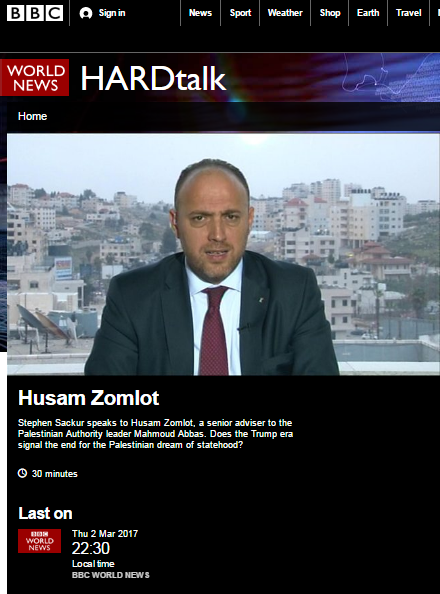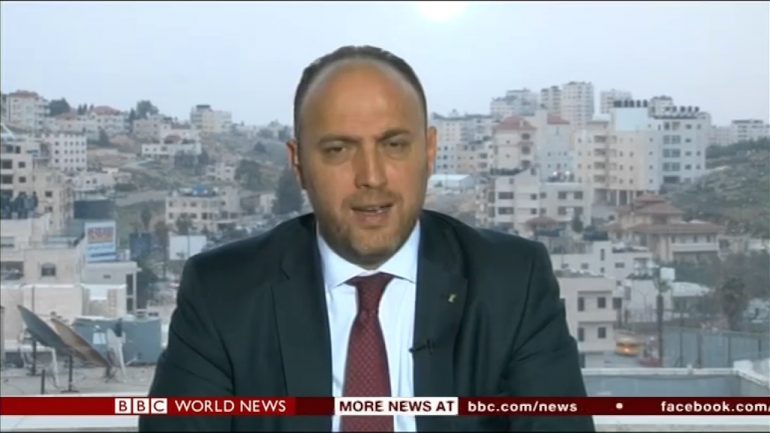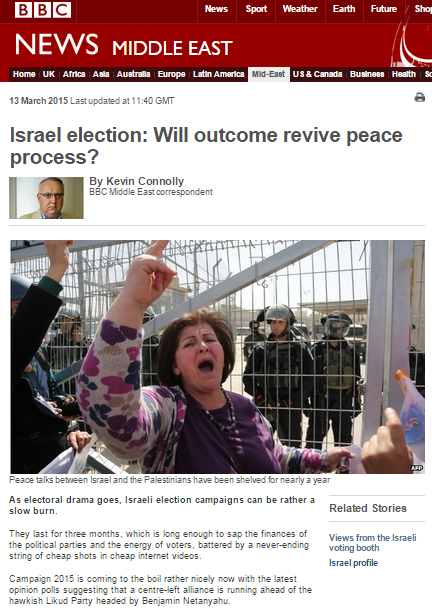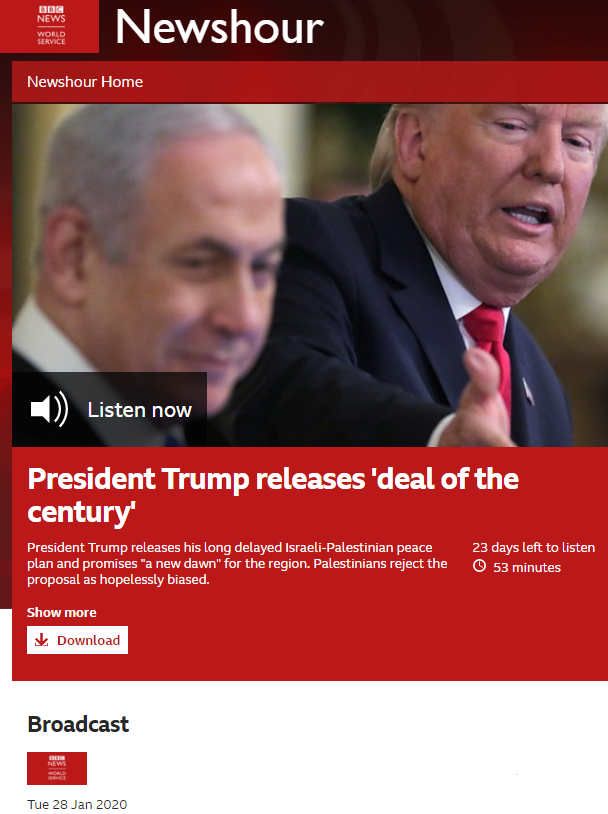The March 2nd edition of the BBC World News programme ‘Hardtalk‘ aired an interview with Fatah’s Husam Zomlot which was billed as follows:
“Stephen Sackur speaks to Husam Zomlot, a senior adviser to the Palestinian Authority leader Mahmoud Abbas. Does the Trump era signal the end for the Palestinian dream of statehood?”
The programme – also broadcast on the BBC News Channel – is available to UK-based viewers here and a clip from the interview was promoted on the BBC News website.
Presenter Stephen Sackur introduced the interview as follows, promoting the BBC’s now well established narrative of a ‘shift’ in US policy regarding the two-state solution.
[all emphasis in italics in the original, emphasis in bold added]
Sackur: “For years the Israeli-Palestinian conflict has been stuck, condemned to repeat itself year in, year out but now something has changed. The two protagonists remain deaf to each other’s demands but there is a new US president who seems to care little for Washington’s long-established quest for a two-state solution. So what does that mean? Well my guest is Husam Zomlot, advisor to the Palestinian Authority leader Mahmoud Abbas. Does the Trump ers signal the end for the Palestinian dream of statehood?”
A significant proportion of the interview related to the Palestinian Authority’s relationship with the new US administration and additional topics included internal Palestinian politics and economy. While some of Zomlot’s claims and statements were challenged – at times vigorously – by Sackur, others were not challenged at all.
Part one of this post will look at the subjects on which Sackur did chose to use his role as interviewer in order to clarify points to BBC audiences and part two will examine the claims and issues on which he refrained from challenging Zomlot.
When Zomlot claimed a “national consensus” regarding the two-state solution, Sackur intervened to clarify to audiences that the claim is inaccurate, although he did not similarly challenge the myth of Israel being on ‘Palestinian land’ or point out that – crucially to the issue under discussion – the PA and Fatah refuse to recognise Israel as the Jewish state.
Zomlot: “And, you know, it took us so many years to get to that national equilibrium here in Palestine; to establish a national consensus on the two-state solution and on accepting, recognising Israel on 78% of our land. […]
Sackur: “…you claim you’ve reached a consensus, which of course you haven’t because that’s why Gaza and the West Bank are so deeply divided politically so we’ll get to that later.”
Sackur challenged Zomlot repeatedly and vigorously with regard to his claims of communication with the new US administration.
Sackur: “That must worry you; that the Trump team do not seem to be interested in talking to you Palestinians.”
Sackur: “Hang on, hang on ‘cos this is important. Hang on, this is important. You’re telling me oh yes, don’t worry; we’ve got the contact. Look, the truth is Binyamin Netanyahu has already had a very cosy meeting with Donald Trump at the White House. Just tell me; what’s the extent of the direct, personal contact between Mahmoud Abbas and Donald Trump?”
Sackur: “Yeah but I asked you a direct question. What’s the direct answer? What’s the direct answer?”
Sackur: “All I can say is you do seem to me to be a wild optimist ‘cos you seem to think that, you know, the Americans are in listening mode and they’re waiting to talk to you.”
Zomlot was challenged extensively on the topic of security co-operation (as laid out in the Oslo Accords) between the Palestinian Authority and Israel, although his false claim that the PLO represents “all Palestinians” was not.
Sackur: “Your boss Mahmoud Abbas said many weeks ago, he said that if Israel pushes ahead with this legislation to legalise settlements built on private Palestinian land, then he would cut security co-operation with Israel. Well of course that bill has now passed through the Knesset but as far as I can see it, Mahmoud Abbas has no intention of making good on that threat. Or am I missing something?”
Zomlot: “No you are missing something because that decision was made and it was made even by the PLO central council and now it’s been approved by this very legitimate sort of parliament for all Palestinians, [it’s] for the executive branch to decide on the timing. Remember, Steve, the issue of security is not just an Israeli demand; it’s not just an Israeli interest. It’s also a Palestinian interest and we don’t want to see a situation here where we…we have groups and agencies from all over the region – and you know what is happening around us, just 300 kilometers all around – and we want to make sure that we deliver such a policy on the right time.”
Sackur: “Well that’s the point, isn’t it? If I may – forgive the interruption – but if I may tease out what you seem to have just said to me, your priority is more in keeping a lid on Hamas in the West Bank than it is in ending security co-operation with Israel.”
Zomlot: “That’s not what I said. No, no. That’s not…we have no lid on Hamas whatsoever. Hamas is in Gaza and has staged a coup d’etat and it’s in full control of Gaza. No that’s not what I said. What I said is that we…”
Sackur: “No but it’s the West Bank we’re talking about. You need the Israeli security co-operation in the West Bank to help you keep yourselves – Fatah – on the top in the West Bank. Israel is your ally in that.”
Sackur went on to challenge Zomlot on the topic of one aspect of the PA economy.
Sackur: “I want to talk economy just briefly if I may. You say yes, we are going to end security and economic co-operation with Israel. I would put it to you; you can’t afford to. First of all you need the Israelis to hand over the customs and the border revenues that come to you through the Israelis and if you lose that, you’re in even worse economic circumstances than you’re in right now. And also the tens of thousands of Palestinians who either work inside Israel – on the other side of the green line – or, you know, frankly, let’s be honest, thousands of Palestinians work on building sites and construction building the very Jewish settlements that you say are the chief obstacle to peace. If you stop all those people doing those jobs, you economy’s going to fall apart.”
Zomlot was also challenged on a topic much neglected by the BBC: internal Palestinian politics.
Sackur: “Why is it that President Mahmoud Abbas has so little credibility? Palestinian opinion polls show that the majority of Palestinians want him gone. He hasn’t won an election for – what is it? – at least a decade. His mandate has run out. Most Palestinians see the Palestinian Authority as corrupt. You are doing yourselves no favours.”
After Zomlot cited in his reply the rescheduled municipal elections as “a pillar of our democratic process” – without either he or Sackur informing viewers that they will not be held in the Gaza Strip – and described the PA as “one of the very few nations in this region that really do adhere to the democratic processes”, Sackur interrupted:
Sackur: “When your mandate lasts four years… when your mandate lasts four years and it was achieved thirteen years ago, you don’t have any legitimacy anymore.”
Zomlot went on to give a bizarre interpretation of democracy which English-speaking BBC audiences would of course have had difficulty following given that the corporation chose not to report on the 7th Fatah party congress.
Zomlot: “Allow me…no, we do have legitimacy because President Abbas is the president of the PLO – of the Palestine Liberation Organisation – which is much, much higher even than the PA. The PA was only established to fulfil our responsibilities under Oslo which Israel has failed miserably. He does have the national legitimacy and he was elected. […] In the end he was voted by Fatah only two months ago in such a democratic process.”
Sackur: “Hang on, hang on, just a moment. Hang on, hang on. You’ve just said something outrageous. You had a chance to answer.”
Sackur raised another topic serially under-reported by the BBC.
Sackur: “That might be a bit more convincing to the outside world if Fatah and the Palestinian Authority in the West Bank didn’t keep locking up opponents, didn’t keep depriving people like Mohammed Dahlan who is an opponent within the PLO [sic] of…[…] You know Dahlan and his people say that it’s time for new leadership, new leadership and you guys refuse to countenance new leadership in your own organisation.”
He did not however react when Zomlot told him that internal Palestinian politics are “even not for the BBC to discuss” – although that approach from a senior Fatah and PA official does perhaps go some way towards explaining why BBC correspondents in the region serially avoid reporting on internal Palestinian affairs.





